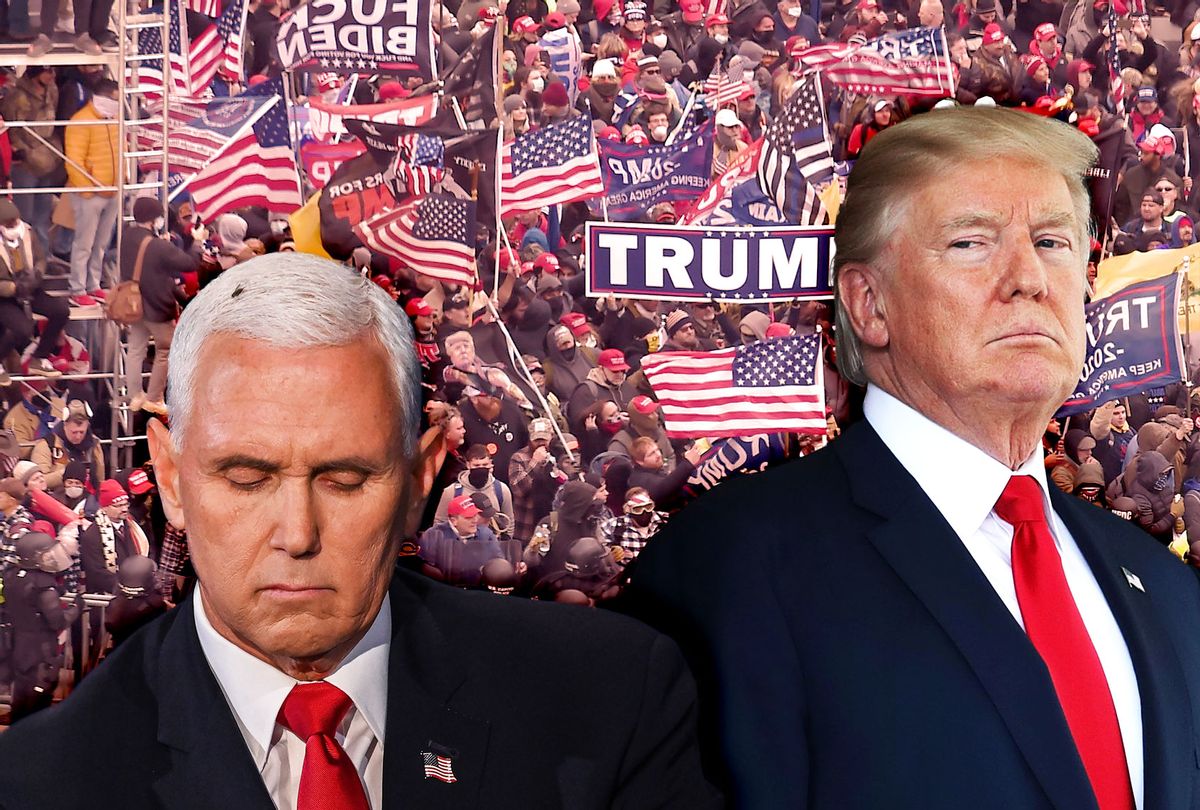As far-right rioters storm the United States Capitol to implement a coup on behalf of President Donald Trump, who refuses to accept his defeat in the 2020 election, the president refused to denounce them in strong language — reportedly because he remains angry at Vice President Mike Pence for not breaking the law on his behalf. And after it was confirmed that at least 4 people died during the hourslong rampage, the president, reportedly still raging that his vice president would not engage in a coup, ramped up his vindictive campaign against Pence.
The vice president's chief of staff, Marc Short, said he was denied entry into the White House late on Wednesday. "He's blaming me for advice to VP," Short said of Trump to Real Clear Politics' Phillip Wegmann. After Trump initially resisted, it was Pence who reportedly mobilized the DC National Guard. Pence also condemned pro-Trump rioters who stormed into the Electoral College certification ceremony he was presiding over.
"You did not win," Pence bluntly stated.
Trump was reportedly both fuming at Pence all day and giddy at the prospect of his supporters successfully delaying the certification of Biden's win. After both "official and unofficial" presidential advisers urged Trump to issue a statement denouncing his supporters' riot because both he, his lawyer Rudy Giuliani and his daughter Ivanka Trump have only said things that give the mob a "permission structure," Trump released a video that was so inflammatory it was taken down from Facebook and Twitter.
In his statement, meanwhile, Pence explained that he does not have the "unilateral authority to decide which electoral votes should be counted."
In fact, the Constitution does not empower the vice president to nullify electoral votes. (If it did, the vice president of any incumbent party that loses a presidential election could subvert democracy on a whim.) It simply says that the vice president should read the slates of electors submitted by each state as they are counted, recite the results aloud and maintain order. Even if the Constitution did vest that power in the vice president, there is no evidence that there was widespread fraud, a fact that has been confirmed by roughly 60 courts, 90 judges, Trump's own attorney general (before he was fired for saying so) and the entire Supreme Court. Not a single case alleging widespread voter fraud in the 2020 presidential election has been supported by any legal institution in the United States, despite dozens of filings by Trump and his backers.
During demonstrations in Washington earlier today, both Trump and Giuliani seemed to urge their supporters to participate in a coup. The president appeared at a rally and told his supporters that "we will never concede," that they should "show strength" and that they should "fight" to move their rally to the steps of the Capitol. He also said that the demonstrators should give "our Republicans" some of the "pride and boldness that they need to take back our country." Later he tweeted that protesters should "stay peaceful" and posted a brief video address that, while urging them to "go home in peace," continued to implicitly legitimize their behavior by falsely claiming "we had an election stolen from us" and characterizing those who say otherwise as "so bad and so evil."
Giuliani expressed a similar sentiment, telling the rioters that "over the next 10 days, we get to see the machines that are crooked, the ballots that are fraudulent. And if we're wrong, we will be made fools of. But if we're right, a lot of them will go to jail. So let's have trial by combat." Sen. Josh Hawley, R-Mo., also encouraged the rioters by pumping his fist in the air as they appeared on the east side of the Capitol just before the riot began. Hawley was the first senator to say that he would object to the Senate's certification of the Electoral College count. Later on Wednesday he tweeted that he was grateful "to the brave law enforcement officials who have put their lives on the line. The violence must end, those who attacked police and broke the law must be prosecuted, and Congress must get back to work and finish its job."
The organizers appeared to understand the message quite clearly, as one of the protest organizers told CNN that "we won't stop fighting until the President does."
Not all of the Republicans who supported Trump's attempt to overturn the 2020 election have backed the rioters. Pence has tweeted that "the violence and destruction taking place at the US Capitol Must Stop and it Must Stop Now. Anyone involved must respect Law Enforcement officers and immediately leave the building." (He also reportedly unfollowed Trump on Twitter.) Rep. Jim Jordan of Ohio tweeted that they should "stop the violence. Support Capitol Police." Sen. Ted Cruz of Texas echoed those thoughts, tweeting that "those storming the Capitol need to stop NOW. The Constitution protects peaceful protest, but violence—from Left or Right— is ALWAYS wrong. And those engaged in violence are hurting the cause they say they support."
The Capitol riots are without precedent in American history. The closest equivalent is the 1860 presidential election, after which seven Southern states seceded because they objected to the election of President Abraham Lincoln. After Lincoln's inauguration, four more states joined the newly-formed Confederate States of America and two others partially seceded. Yet even though those states reacted violently to the election of a presidential candidate they disliked, none of them suggested that his predecessor — the pro-slavery President James Buchanan — should stay in office by force or that Lincoln's victory was illegitimate. There has never been an occasion when a sitting president has encouraged his supporters to stop the certification of his opponent's victory by force.



Shares